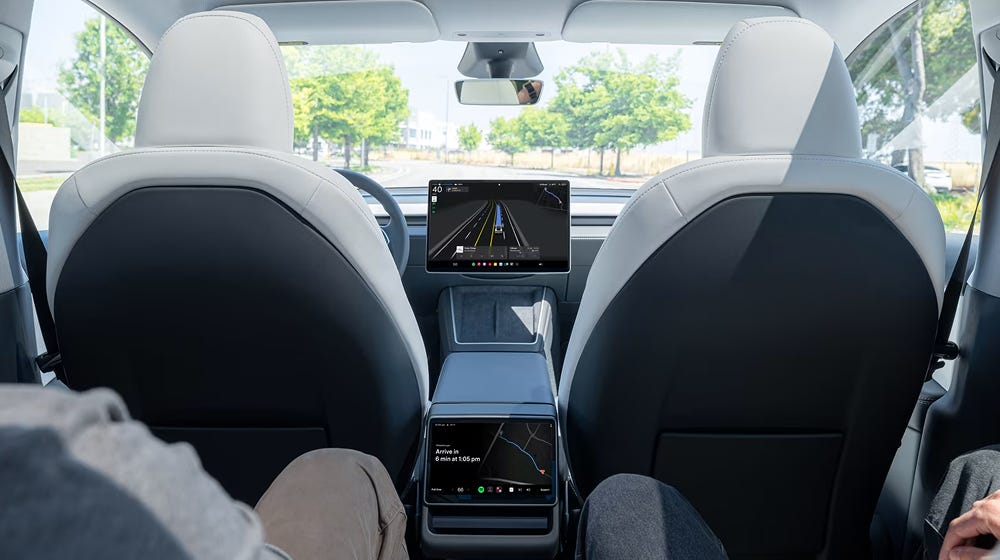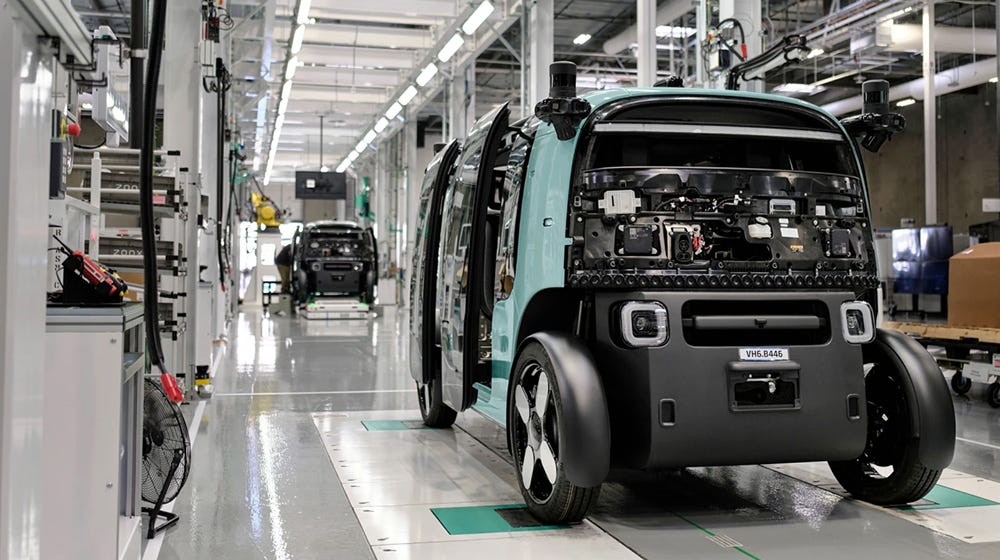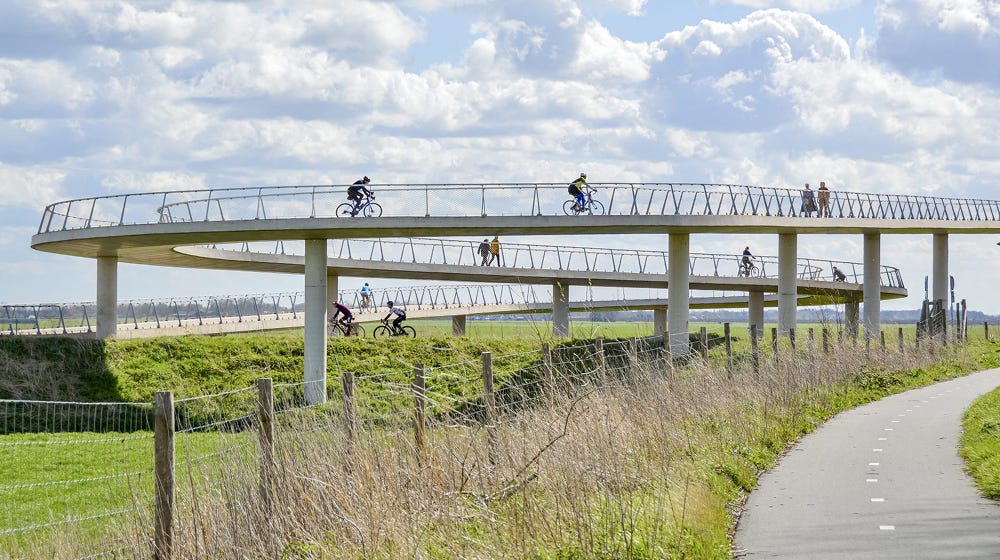Welcome to CoMotion NEWS, your weekly roundup of news and analysis of the mobility revolution. If this email was forwarded, you can sign up here for NEWS.
If you were shorting Tesla stock in hopes of an epic fail, you’re out of luck, at least so far. Tesla’s much-anticipated, invite-only robotaxi kick-off in Austin was hardly groundbreaking, but nothing went horribly wrong, either. The summer is young –– and if there’s anything that has been made abundantly clear about Elon Musk, it’s that he has a hard time playing safe for long.
Further along in the autonomous journey is Amazon’s Zoox, which has been offering rides in Vegas for some time and just opened its robotaxi factory in Arizona. And leading the pack, of course, is Alphabet’s Waymo, now dipping its toe into the coveted New York City market after operating commercially in several other major cities.
Also: China is flooding Brazil’s auto market, New Jersey suffers an umpteenth delay of a long-awaited rail extension, China achieves a train speed record, and researchers explain why so many people get car sick in EVs. Finally, a look at the “bikenomics” lens through which the Dutch evaluate transportation projects.
What you need to know

Tesla’s robotaxi era begins: Tesla launches its long-awaited robotaxi trial in Austin, Tex. So far it only includes a dozen or so vehicles, is only operating in a certain geofenced district of the city and is only available to a small group of people invited to participate. There are also human safety monitors riding in the passenger seat. At this point it’s far behind what Waymo is already doing in a number of U.S. cities, including Austin. But the fact that the first couple days of the trial have been incident-free keeps alive the dream that Elon Musk will fulfill his promise to make Tesla a multi-trillion dollar robotaxi empire. It better work out or else Tesla’s valuation could drop like a lead balloon…
…BTW, a great time to buy a Tesla: Nothing better demonstrates the stakes of the Austin robotaxi trial to Tesla’s valuation than the plummeting prices of used Tesla vehicles. The average price of a 1-5 year-old used Model 3 has dropped 10% over the past year to $25,361, according to a new analysis by iSeeCars, while average prices for the more expensive Model S and Model Y declined 16% and 14%, respectively. In comparison, prices for many other used vehicles rose during the same time period. Not a great look.
China floods Brazil with EVs: Three Chinese automakers command 80% of Brazil’s fledgling EV market, prompting the government to increase import tariffs in hopes of protecting domestic manufacturing. It’s yet another sign of China’s burgeoning auto industry upending a global market long-dominated by the U.S., European and Japanese players.
Paving Progress: Building Coalitions for Urbanism with Steve Adler
In this episode, Nick Perloff-Giles sits down with Steve Adler, former mayor and city councilmember of Austin, TX. They discuss the work required to bridge across interest groups, passing legislation with long time horizons, and how to build consensus for large-scale transit projects.
The state of e-scooters in Europe: Transportation writer David Zipper sits down with Karen Vancluysen, secretary general of POLIS, a network of European cities that collaborates on transportation innovation, to talk about the ways the political landscape has evolved around scooters since their controversial arrival seven years ago. To Vancluysen, cities with strong bike networks, like Amsterdam, don’t get much out of scooters, but she believes the pros outweigh the cons in many others.
Waymo eyes NYC: Alphabet’s robotaxi service applies to test autonomous vehicles in Manhattan, the Holy Grail of ride-hailing. However, big legal roadblocks stand in the way of Waymo launching a commercial service like it has in a number of other major U.S. cities. Most notably, New York state law does not allow fully autonomous ride-hailing. Laws can change, of course …

Zoox opens first robotaxi factory: Amazon’s autonomous driving unit begins operations of a 220,000 square foot facility in Hayward, Calif. that it says will one day produce 10,000 robotaxi vehicles per year. It’s a bold move considering that Zoox is not nearly as far along as Waymo in proving itself as a robotaxi service. The company is testing its vehicles in San Francisco and offering autonomous rides in Las Vegas on a limited basis. It plans to launch paid rides in Vegas later this year.
An ultra high-speed rail milestone: China’s Donghu Laboratory accelerates a 1.1 ton test vehicle to 650 km/h (404 mph) in seven seconds and brings it to a total stop from top speed within 200 meters. Not bad!
Sick of EVs: A surprising number of people say they experience motion sickness in EVs. Experts say it’s likely because EVs lack the noises that serve as cues for acceleration and braking in combustion vehicles, allowing those with sensitive stomachs to subconsciously prepare for the shift in motion.
Highlights from the Paris Air Show: The annual three-day event last week included some big news for green fuel and eVTOL startups. Among other things, Airbus unveiled a partnership with German engine manufacturer MTU Aero Engines to develop hydrogen-powered fuel cell engines, while Archer Aviation announced a partnership with Dubai-based airport services provider Jetex to set up vertiports to provide air taxi service in the UAE in the near future.
This is why America can’t build rail: NJ Transit officials say they need another year before hiring a consultant to conduct the fourth federal environmental impact study of a proposed nine-mile light rail extension that has been in the works for 25 years. The Hudson-Bergen Light Rail Extension has become a poster child for the many problems that bedevil transit projects in the U.S., including capricious federal regulators, litigious NIMBYs and transit agencies that try to please everybody but end up pleasing no one.
…and why Australia struggles with it: The Guardian looks at decades of foiled attempts to extend train lines to Sydney’s beaches, largely due to opposition from locals, notably beloved Australian actor Michael Caton.
But Chile shows the way: Santiago, Chile is on a rail building spree, delivering new routes for less than a sixth as much as its American counterparts –– and in a fraction of the time. The key, a top Santiago transit official tells Cities Today, is strong project management that ensures coordination between all of the different entities involved in construction.
What we’re reading

The case for bikenomics: CoMotion friend Chris Bruntlett of the Dutch Cycling Embassy describes how the Netherlands has begun to evaluate transportation investments through a “bikenomics” lens, considering the costs and benefits to taxpayers of, say, a new car parking garage versus a 12,500-space bike parking facility. This type of analysis has allowed the city of Utrecht to justify ambitious bike infrastructure projects that even in the cycling-crazy Netherlands are considered extravagant, such as the emerging network of “cycle highways” aimed at getting people out of cars and onto e-bike for mid-distance (3-10 mile) trips.
CoMotion's mobility goodness brought to you by:
Jack Craver,
Editor, CoMotion NEWS
jcraver@comotionglobal.com
Write to us if you would like to suggest content for our next newsletter!
Partner with us
Our events CoMotion LA, CoMotion MIAMI, and the Monaco Hydrogen Forum represent a unique opportunity to build global awareness in the industry. Build influence, elevate your brand, and connect with ground-breaking companies and public sector leaders.
“It's really exciting to be at this year's CoMotion, with the best, most creative, and innovative minds together thinking about solutions on how we advance transportation.” - Laura Rubio Cornejo, General Manager, LADOT
Email us if you are interested in learning more.
YouTube | LinkedIn | Podcast | X | Instagram




